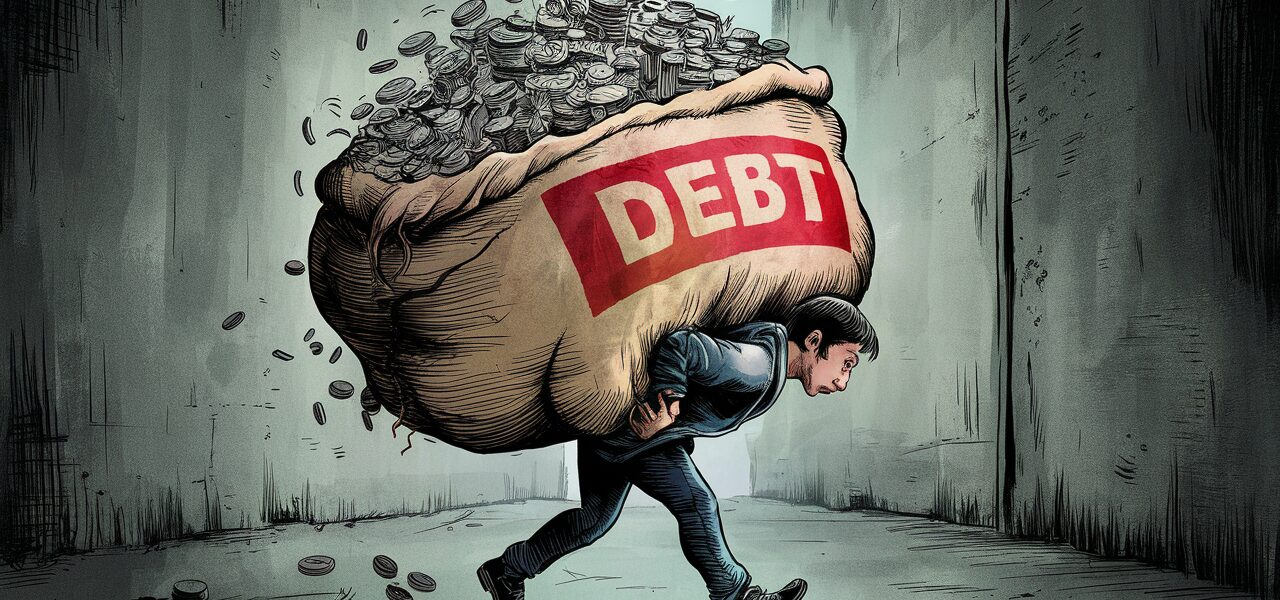Did you know that unpaid personal debts in the United States total over $120 billion annually? If you’re someone who has been left hanging with an unpaid debt, you’re not alone. It can be frustrating and disheartening when someone fails to pay you back, leaving you wondering how to recoup your money.
Key Takeaways:
- Unpaid personal debts in the US amount to over $120 billion annually.
- Shaming someone who owes you money can be an effective strategy to prompt repayment.
- Consider the debtor’s intentions and approach the situation with empathy.
- Direct communication is often the first step in resolving the issue.
- If all else fails, legal actions may be necessary.
Consider their Intentions

Before shaming someone who owes you money, it is crucial to take a step back and consider their intentions. While it may be tempting to immediately assume that they are intentionally avoiding repayment, there could be other reasons for their behavior. By approaching the situation with empathy and understanding, you can gain valuable insight into their motivations, which will help guide your strategy in dealing with the issue.
Dealing with friends who owe you money can be a delicate matter. It’s important to give them the benefit of the doubt and consider the possibility that there might be extenuating circumstances preventing them from paying you back promptly. Perhaps they are facing financial difficulties, experiencing job loss, or dealing with unexpected expenses.
By taking the time to understand their intentions, you can approach the situation in a less confrontational manner and potentially find a resolution that preserves your relationship with the individual. This approach allows for open communication and the possibility of working together to find a mutually beneficial solution. It’s essential to remember that friendships are built on trust and understanding, and handling financial matters with compassion can help maintain that trust.
| Consider Their Intentions |
|---|
| 1. Evaluate the person’s financial situation. |
| 2. Assess if there are any extenuating circumstances. |
| 3. Take their past behavior into account. |
| 4. Approach the situation with empathy and understanding. |
| 5. Communicate openly and listen to their perspective. |
Direct Communication

One subtle and effective strategy for demanding repayment from someone who owes you money is through direct communication. By initiating an open and honest conversation with the debtor, you can maintain a respectful approach while reminding them of their outstanding debt. This method allows for a mature discussion about the situation without resorting to manipulation or public shaming.
When engaging in direct communication, it’s crucial to have a clear objective in mind. Begin by establishing the purpose of the conversation, which is to seek repayment and resolve the financial obligation.
Here are some key points to consider when employing direct communication:
- Choose the Right Time and Place: Select a comfortable and private space where both parties can openly discuss the issue without distractions or interruptions.
- Use a Calm and Non-Confrontational Tone: Approach the conversation in a composed and respectful manner to avoid escalating tensions.
- Remind Them of the Debt: Politely but firmly remind the person of the money they owe you, specifying the amount and the agreed-upon terms.
- Ask for a Repayment Plan: Inquire about their financial circumstances and propose a realistic repayment plan that satisfies both parties.
- Provide Options: Offer various methods of repayment to accommodate their preferences, such as monthly installments or a lump-sum payment.
By utilizing direct communication, you can express your concerns to the debtor while maintaining a level-headed approach. Remember to listen actively to their responses and be open to finding a mutually agreeable solution.
Example:
Debtor: I’m really sorry I haven’t paid you back yet. I’ve been going through financial difficulties lately.
Creditor: I understand that times can be tough. However, the money you owe me has been impacting my own financial situation. Let’s find a way to resolve this together.
Approaching the situation with empathy and understanding can pave the way for a constructive conversation that increases the likelihood of repayment.
| Pros of Direct Communication | Cons of Direct Communication |
|---|---|
| Allows for open and honest discussion | Potential for confrontation or defensiveness |
| Maintains a respectful approach | Does not guarantee immediate payment |
| Encourages finding a mutually agreeable solution | Relies on the debtor’s willingness to cooperate |
Public Shame

If direct communication fails to yield the desired results, there are more public ways you can consider shaming someone who owes you money. While these tactics may not be suitable for every situation, they can be effective in encouraging debtors to fulfill their obligations.
One approach is to make a lighthearted joke about the debt in a social setting. By subtly bringing up the topic in a humorous manner, you can indirectly remind the debtor of their outstanding payment. This tactic allows you to address the issue without resorting to aggressive confrontation.
“Hey, remember that time I funded your extravagant shopping spree? Should I start a GoFundMe page for myself now?”
Another option is to confide in an extroverted friend who has a natural tendency to bring up sensitive topics. By casually mentioning the debt in front of this friend, you can increase the likelihood of the debtor feeling embarrassed and compelled to make amends.
Additionally, passive-aggressive posts on social media can serve as a subtle way to shame the debtor. Craft a post that alludes to the unpaid debt without explicitly naming the person involved. This tactic lets the debtor know that others are aware of the situation and can increase the pressure for them to take action.
Remember, it is essential to exercise judgment and consider the specific circumstances before resorting to public shaming tactics. While they can be effective, they may also strain relationships and escalate the situation further. Use these tactics sparingly and as a last resort to motivate debtors to honor their financial commitments.
Legal Actions
If all else fails, there are legal routes available to help you get your money back. It’s important to understand the tactics that can be used and the best ways to navigate the legal system in order to secure repayment.
Small Claims Court
If the amount owed to you falls below a certain threshold, taking the person to small claims court can be a viable option. Small claims court is designed to handle disputes involving smaller amounts of money without the need for formal legal representation. This can be a relatively quick and cost-effective way to resolve your debt issue. Make sure to gather all relevant documentation and evidence to support your case.
Filing a Lawsuit
If the debt owed to you is larger and exceeds the jurisdiction of small claims court, filing a lawsuit in a civil court may be necessary. This can be a more complex and time-consuming process, but with the help of a lawyer, you can navigate the legal system and present your case effectively. Remember to keep all communication and evidence related to the debt to strengthen your position in court.
Consult with a Lawyer
When considering legal actions, it’s crucial to consult with a lawyer who specializes in debt collection. They can provide expert advice on the best course of action based on your specific situation and jurisdiction. A lawyer can help you understand the legal options available, review your case, and guide you through the legal process.
It’s important to approach legal actions with the goal of resolving the debt professionally and amicably. While it can be frustrating to go through legal proceedings, it’s essential to avoid burning bridges, especially if you have a prior relationship with the debtor. Maintain a respectful demeanor throughout the process to increase the chances of successful recovery.
| Tactic | Description |
|---|---|
| Small Claims Court | A legal option for pursuing debts below a certain threshold with limited formalities and costs. |
| Filing a Lawsuit | A more complex and time-consuming option for larger debts that require involvement from a civil court. |
| Consulting with a Lawyer | Seeking advice from a debt collection specialized lawyer to understand the best legal actions to take. |
Conclusion
Dealing with friends or acquaintances who owe you money can be a challenging and sensitive situation.
When someone fails to repay their debt, it’s vital to approach the situation with empathy and understanding. Consider their intentions before resorting to shaming tactics. Maybe they are facing financial difficulties or simply forgot about the debt.
Instead of immediately resorting to public shaming, try engaging in direct communication. Have an open and honest conversation about the debt, reminding the person of their obligation and discussing a repayment plan.
If direct communication doesn’t yield results, you may need to explore legal actions as a last resort. Consult with a lawyer to understand the legal options available to you, such as small claims court or a civil lawsuit.
Remember, the ultimate goal is to secure repayment without damaging relationships. While shaming tactics can be effective in some cases, it’s essential to handle the situation delicately and preserve the trust and respect between you and the person who owes you money.
FAQ
How can I shame someone who owes me money without damaging the relationship?
It’s essential to consider the person’s intentions and approach the situation with empathy. Communicating directly and having an open and honest conversation about the debt is often the best way to address the issue.
What if direct communication doesn’t work?

If direct communication fails to yield results, you may consider more public forms of shaming. This can include making lighthearted jokes about the debt in a social setting, telling an extroverted friend who can’t resist bringing up the situation, or making a passive-aggressive post on social media.
Are there legal actions I can take to get my money back?
Yes, if all else fails, you may need to consider legal routes to get your money back. This can include taking the person to small claims court if the amount owed is below a certain threshold or filing a lawsuit in a civil court if the debt is larger. It’s important to consult with a lawyer and understand the legal options available to you in your jurisdiction.
How can I shame a debtor without resorting to legal actions?
While legal actions should be a last resort, public shaming tactics can sometimes be effective. Making lighthearted jokes about the debt, relying on an extroverted friend to bring up the situation, or making a passive-aggressive post on social media can indirectly shame the debtor and encourage them to repay the money.
Should I consider the person’s intentions before shaming them for not paying me back?
It’s important to consider the person’s intentions before shaming them for not paying you back. Understanding their motivations and approaching the situation with empathy can help guide your strategy and potentially resolve the issue without resorting to tactics that may damage the relationship.




